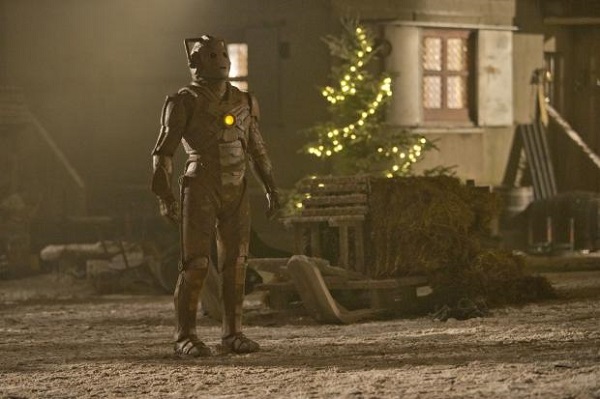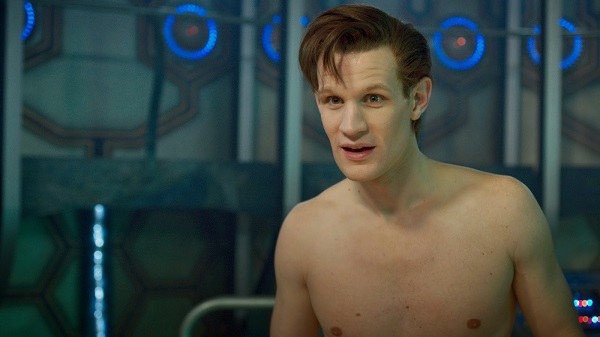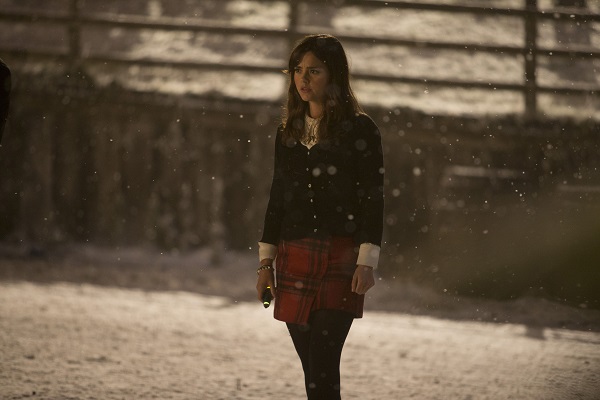
Written by Steven Moffat
Directed by Jamie Payne
Aired Christmas at 9pm (ET) on BBC America
This week, on Doctor Who: Clara tries to cook a turkey, Tasha procures marshmallows, and the Doctor whittles
Doctor Who is a fascinating series that embraces change and creativity like no other. Each era of the show, be it defined by its Doctor or producer, has its own identity, point of view, and particular strengths and weaknesses. Unlike the fantastic 50th Anniversary special, which was far more concerned with the entire modern series, “The Time of the Doctor” crystallizes the recent Matt Smith/Steven Moffat era and highlights its characteristics incredibly well. Fans of the recent seasons will undoubtedly love “The Time of the Doctor”. Those of us less enthused with them are far more likely to be left cold.
There are many things to like about this Christmas special. Matt Smith and Jenna Coleman are once again on top form, doing their best with the material given them. Orla Brady, so memorable to fans of Fringe as Elizabeth Bishop, is a welcome addition to the mix and there are enough Christmassy touches to thematically tie “The Time of the Doctor” to its airdate without it becoming bogged down, as has been a problem in the past. There are a couple particularly nice moments between the Doctor and Clara on the TARDIS, Peter Capaldi looks like he’ll be fun, and the Eleventh Doctor’s final speech speaks well to the long history of the series and of the character himself.
Unfortunately, these elements are not enough to save what is otherwise a frustrating, poorly scripted, and insulting special.
 In short, “The Time of the Doctor” features a plot that, while it is easy (on the Moffat scale) to follow, almost immediately fails the, “But why?” test. Why does the fleet understand what “Doctor who?” means? Because the plot needs them to. Why doesn’t the Doctor take the townspeople out of harm’s way with the TARDIS? Because. Why do the Doctor and Clara need to be naked, for that matter? Because. The answers we finally get to lingering questions aren’t satisfying, the promising new character of Tasha Lem is a pretty straightforward copy of River Song, and the gender politics are terrible (and in this reviewer’s opinion, destructive). The Doctor may have some fantastic scenes, including the final moments with Clara before his regeneration, but he treats her terribly and she doesn’t for a moment stand up for herself. After the wonderful “The Day of the Doctor”, this final story for the Eleventh Doctor is a significant disappointment, highlighting all of the most problematic elements of his tenure.
In short, “The Time of the Doctor” features a plot that, while it is easy (on the Moffat scale) to follow, almost immediately fails the, “But why?” test. Why does the fleet understand what “Doctor who?” means? Because the plot needs them to. Why doesn’t the Doctor take the townspeople out of harm’s way with the TARDIS? Because. Why do the Doctor and Clara need to be naked, for that matter? Because. The answers we finally get to lingering questions aren’t satisfying, the promising new character of Tasha Lem is a pretty straightforward copy of River Song, and the gender politics are terrible (and in this reviewer’s opinion, destructive). The Doctor may have some fantastic scenes, including the final moments with Clara before his regeneration, but he treats her terribly and she doesn’t for a moment stand up for herself. After the wonderful “The Day of the Doctor”, this final story for the Eleventh Doctor is a significant disappointment, highlighting all of the most problematic elements of his tenure.
For those looking for an in-depth discussion of the issues above, read on. For those less interested in specifics, I look forward to hearing from you in the comments. Please keep in mind that my not liking this episode does not negate my love of the series. Yes, I am a Whovian, yes I have seen all of the series (including the reconstructions), and while I have all but given up on Moffat’s era, I hope to be surprised by the Twelfth Doctor’s first season. All of that being said, what did you think of “The Time of the Doctor”?
Kate Kulzick
In-depth Reaction:
Where to begin? Putting aside the labyrinthine nature of the plot (those unwilling to put some work into following Moffat’s often needlessly-complicated storylines should probably have tuned out by now), the special fails on a story level because very little of what we see needs to happen. As soon as he has his TARDIS back, the Doctor could move the entire town of Christmas (people and possessions) to a suitably habitable planet out of harm’s way, saving all of their lives and stopping the siege. He doesn’t do this- he leaves his beloved townspeople (who are shockingly resilient despite constant Sontaran, Cybermen, Dalek, and Weeping Angel attacks) in the crossfire while he what, whittles?
Also, as the crack has been established as being non-physical (in “The Eleventh Hour” it isn’t part of Amelia’s wall, it would be there even if the house weren’t), it shouldn’t be effected by the various baddies destroying Christmas. All they want is to stop the Doctor from saying his name- if he and all the Christmasians (Christmasers?) leave, there’s nothing for them to do about Gallifrey. It would be a stalemate, but without any townspeople dying and with the Doctor able to live his life. Just as in “The Angels Take Manhattan” (the Doctor can’t go back to New York! Or land in Jersey and hop a bus. Or come a year later. Or…), Moffat builds his entire story around a dramatic premise (here, that the Doctor can’t run away) without laying down the foundation needed to make it a valid one.
Then there’s “Doctor who?”. Moffat has been building to this reveal for seasons and now that it’s here, it doesn’t even make sense. “<Name> who?” isn’t a question at all, it’s meaningless, outside of the context of the title of the show (it should mean absolutely nothing to the characters, who don’t know they’re on a show called Doctor Who). Putting that aside for a moment however, so much weight is given to the reveal of the question and its origin that Moffat doesn’t bother mentioning how the fleet in orbit understands the question’s meaning. No one should know the Time Lords are alive- the entire universe, including until very recently the Doctor, “knows” that Gallifrey was destroyed in the Time War. This was established in the most recent story, which Moffat also wrote. There’s no reason these two stories should conflict so significantly- it’s sloppy, lazy writing.

**before Tasha Lem overpowers her inner Dalek, encouraged by the Doctor’s insults. Yes, it’s very Fourth Doctor, but that doesn’t make it any less groan-worthy. Apparently being a Dalek puppet isn’t enough to make her mad- she needs the Doctor to say he is disappointed in her to really get her fired up, because what’s more inspiring, wanting to get your body/consciousness/life back or wanting to slap the Doctor?
The character moments are where the story will either succeed or fail for viewers. As mentioned above, the performers are excellent. The problem here, once again, is the script. Let’s start with the Doctor. Despite a well-demonstrated inability to sit still for even a moment (“The Lodger”, “The Power of Three”, etc.), the Eleventh Doctor is suddenly content whittling toys for 300 years and his personality isn’t particularly affected by this drastic shift in lifestyle and experience. He’s now spent more of his life in Christmas than anywhere or anywhen else. Ever. He should care far more for Christmas and Trenzalore than Earth, but it seems unlikely this will be reflected in the coming seasons.
 Setting these dramatic character shifts aside, once more we get the highly sexualized and even sexually predatory Doctor we’ve seen with increasing frequency in recent seasons. Moffat’s consistent in this, at least. In this episode, he’s squickily leery towards Clara on the phone (why does it seem likely that the manual he’s referencing is more akin to the Kama Sutra than a dating advice book?), he exposes himself to her, he slaps her butt, he suggests naked Twister (yes, theoretically they’ll see him as dressed, but a hologram projected to the visual cortex doesn’t do anything for an unfortunately placed hand), he and Tasha get about as heated as characters do on Who, and then later, he grabs and kisses her, because he gets to do that, ‘cause he’s the Doctor and he feels like it (and she was flirting earlier, so she totally wanted it). Doctor Who is a family show. It is geared specifically towards children. By presenting the Doctor in this way, and making him a veritable super hero, he’s presenting a model of behavior for children that is not only problematic, but downright destructive.
Setting these dramatic character shifts aside, once more we get the highly sexualized and even sexually predatory Doctor we’ve seen with increasing frequency in recent seasons. Moffat’s consistent in this, at least. In this episode, he’s squickily leery towards Clara on the phone (why does it seem likely that the manual he’s referencing is more akin to the Kama Sutra than a dating advice book?), he exposes himself to her, he slaps her butt, he suggests naked Twister (yes, theoretically they’ll see him as dressed, but a hologram projected to the visual cortex doesn’t do anything for an unfortunately placed hand), he and Tasha get about as heated as characters do on Who, and then later, he grabs and kisses her, because he gets to do that, ‘cause he’s the Doctor and he feels like it (and she was flirting earlier, so she totally wanted it). Doctor Who is a family show. It is geared specifically towards children. By presenting the Doctor in this way, and making him a veritable super hero, he’s presenting a model of behavior for children that is not only problematic, but downright destructive.
Given her role as Mother Superious, Tasha Lem should be an interesting character. She’s portrayed by an excellent actress and she seems very intelligent and capable. Unfortunately, she turns out to be River 2.0- a mature, powerful psychopath seemingly defined solely by her flirtatious relationship with the Doctor. What is her motivation for pitting her entire Church against the rest of the Universe to help the Doctor? We have little sense of their relationship and rather than explore this, we get the same dancing-around-a-bed routine (either physically, as here, or metaphorically) we’ve seen with the Doctor and several of the show’s recent female guest stars. It’s an utter waste of a character and an opportunity- if Moffat can’t come up with a different female character he’s interested in writing, he should just bring River back (again).
The single most troubling characterization in the special, however, is that of Clara. We know very little about her, but one of the few things we do is that she loves baking, due to her memories of her mother. Obviously cooking and baking are very different, but someone who can handle soufflés, one of the most notoriously difficult dishes to prepare, can’t handle a turkey? Apparently Clara’s also been calling in the Doctor to fix other aspects of her life for her, such as wanting to have placed dinner reservations ahead of time, forgetting birthdays, and forgetting to set the DVR. Which of her problems is Clara capable of solving for herself?
 Perhaps that’s why she’s staying in this emotionally abusive relationship with the Doctor. He consistently lies to her and takes any choice in her fate away from her. This week he grabs her, introduces her as his “… associate”, rather than friend or Companion, and decides she isn’t trustworthy enough (or otherwise worthy) to hear most of what Tasha might have to say to him. He abandons her, twice, the second time immediately after looking her in the eye and promising he won’t. This is clearly not a respectful or healthy relationship, and yet she keeps coming back for more. All of time and space for her to experience, and why does she travel with the Doctor? We learn this week, thanks to the truth field- because she quite fancies him. Not for adventure, not to learn, but because isn’t the Doctor dreamy.
Perhaps that’s why she’s staying in this emotionally abusive relationship with the Doctor. He consistently lies to her and takes any choice in her fate away from her. This week he grabs her, introduces her as his “… associate”, rather than friend or Companion, and decides she isn’t trustworthy enough (or otherwise worthy) to hear most of what Tasha might have to say to him. He abandons her, twice, the second time immediately after looking her in the eye and promising he won’t. This is clearly not a respectful or healthy relationship, and yet she keeps coming back for more. All of time and space for her to experience, and why does she travel with the Doctor? We learn this week, thanks to the truth field- because she quite fancies him. Not for adventure, not to learn, but because isn’t the Doctor dreamy.
We also learn, courtesy of the truth field, that she thinks she’s a control freak. It’s actually a rather interesting self-assessment, given her utter lack of control of any aspect of her life while she’s with the Doctor. Would any other modern Companion have been content to sit outside the Doctor’s meeting with Tasha Lem, twiddling her thumbs and waiting to be allowed in? Clara first laughs at the Doctor’s flirtation with Tasha outside the meeting room, then looks jealous when they’re flirting inside. When she runs in, by the way, she’s completely terrified. The Doctor either doesn’t notice or doesn’t care, and then barks monosyllabic orders at her without filling her in on anything that’s happening. Orders she follows without question, or even any indication that she thinks she deserves to be treated better than this.
Then there are the closing moments. The Eleventh Doctor’s final speech is absolutely beautiful, and had he regenerated then, it might have been lovely enough to wipe away memories of the ridiculous regeneration-energy-as-Dalek-killing-bomb non-regeneration a few minutes earlier. Unfortunately, this fantastic examination of regeneration as a parallel to the ways each person is shaped by their experiences is followed up by a cameo from first Amelia, and then Amy. A slightly odd, CGI/computer Amy (perhaps to indicate that she’s a projection?). Clara is standing right there, emotional and upset and trying to process what’s happening, but again, he doesn’t care. He doesn’t want to spend his final moments with Clara, who sacrificed her life to repair his timeline, who’s saved him time and again in different regenerations. He wants to spend them with Amy, who’s not even there. That says everything the audience needs to know about how the Doctor views Clara.
Doctor Who has been uneven at best since the Eleventh Doctor’s (overall) fantastic first season. At this point, it’s clear that the problem isn’t the cast, the budget, or any other production element; it’s Steven Moffat. From his disconcerting sexual politics to his more-is-more approach to his apparent dearth of new ideas, Moffat is actively hurting the show at this point. He is clearly a talented writer; several of his stories are among the best in the show’s 50-year run. That doesn’t change how fundamentally flawed his current vision for the show is. With the new Doctor, Moffat has the opportunity to start fresh and fix most of these issues. It seems unlikely, but at this point, it’s all this Whovian has to hold on to. Here’s hoping Capaldi has a different direction in mind for his Doctor, and Doctor Who in general, than what we were given in “The Time of the Doctor”.
-“Don’t even blink” was effective the first time. Less so the second time. Here, it’s just a reminder that the Weeping Angels used to be scary.
-The whole point of confessing is to unburden one’s soul. If you don’t remember doing it, it doesn’t have any impact. Also, confessing is almost meaningless if you don’t choose to do it, but are subconsciously forced to do so. Therefor the only purpose the Silents seem to serve is gathering blackmail-able intel and manipulating others for the Church. Also, why do priests need to be genetically engineered to shoot electricity?
-Speaking of, guess Clara hasn’t seen the video of Neil Armstrong landing on the moon. Nice to not have her turned into a murderer against her will, even if it is a direct contradiction of “The Day of the Moon”.
-Wasn’t Gallifrey frozen in time? How did they unfreeze? For that matter, how do they close a crack in space and time created by the Silence, one they didn’t cause, and then reopen it somewhere else? Wasn’t the whole point of the pulse to draw the Doctor to them because they couldn’t move the crack and/or find him? How do they do both at the end, besides the clear actual answer of Deus ex Crackina?
-Why does the Doctor age this much physically after 300 years when 200 years didn’t change his appearance a bit in “The Impossible Astronaut”? What was the point of any of these time jumps, other than to let Matt Smith channel the Seventh Doctor with his cane (particularly considering the aging is conveniently undone at the end so the audience can say goodbye to the Doctor they remember, not the Doctor he becomes in this story)?
-The Doctor runs around brandishing a fallen enemy’s decapitated head. Twice. Then he tricks an enemy into killing itself and gloats over its dead body. My hero!



